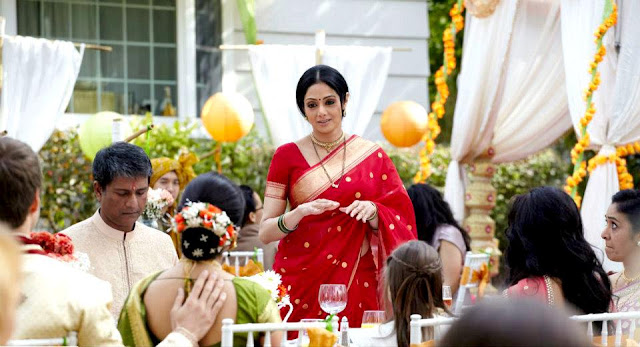 |
| The wedding toast scene from English Vinglish (2012), featuring Shashi (played by Sridevi - who's about 49 at the time!) |
From then on, I've noticed, people in Jaipur are usually surprised, delighted, or entertained when they find out a foreigner is learning their language and welcome it. Whether I’m chatting with vendors, rickshawalas (rickshaw drivers), waiters, or just any strangers, people are impressed with the fact that I am learning Hindi, and even impressed with my speaking skills — when I know that my accent is far from accurate. It’s encouraging to know that my efforts learning Hindi in India are appreciated. Having this experience, however, makes me think about the experience of learning English in America and in the world.
Appropriately, our class watched “English Vinglish” (2012) (summary and review), a Bollywood movie about the struggles of Shashi, an Indian woman determined to learn English. At home in Pune, her family members make subtle (sometimes not), biting comments about her lack of English knowledge and in general, make her feel inferior. When she has to travel to New York for a niece’s wedding, she takes the opportunity to “Learn English In 4 Weeks” after seeing an advertisement.
Shashi’s struggles, growth, friendships, and romantic drama all amount to the climactic scene at the wedding, when she’s asked to make a toast and her husband, as usual, tries to silence her, apologizing to the crowd for her lack of English skills (what a jerk). But Shashi surprises the crowd and proves herself with a touching speech in English about love, family, and self-respect. Shabash, Shashi! (Way to go, Shashi!)
 You should see the look on her husband’s face when he watches Shashi order food in English on the plane at the end of the movie — it’s like she has acquired new worth in his eyes. I found that uncomfortable. As cute and fun as the movie was, the whole premise of the film had undertones about language in India that I couldn’t ignore. Shashi’s story projected the idea that someone’s worth can rely on their ability to speak a language, specifically English, which reflects the reality in India and perhaps other similarly colonized countries.
You should see the look on her husband’s face when he watches Shashi order food in English on the plane at the end of the movie — it’s like she has acquired new worth in his eyes. I found that uncomfortable. As cute and fun as the movie was, the whole premise of the film had undertones about language in India that I couldn’t ignore. Shashi’s story projected the idea that someone’s worth can rely on their ability to speak a language, specifically English, which reflects the reality in India and perhaps other similarly colonized countries.Read this enlightening article I found from Forbes about “The Problem with the English Language in India” (2014) by Sahith Aula. It highlights and explains the oppression that results when a minority language is considered institutionally, systematically elite. With just 30% able, “to varying degrees,” speak English, and even less able to read and write it, there's a barrier to access for the vast majority of the country. As Aula states, “a person’s socioeconomic status in Indian society is approximately in line with his or her fluency in [English],” because so many institutions, including those of government, employment, education, and health operate in English rather than the local languages that the majority of people speak in each region.
This presents some kind of hierarchy of language where English and English speakers are higher up. The people in India who are surprised or happy about my learning Hindi find it unusual and ironic; one time a rickshawala said that, when local people find out Westerners are learning Hindi, they're wide eyed, because we are the ones who are trying to learn English! Furthermore, when I tell Americans that I'm learning Hindi, many have said, "Why? People speak English there!" — which is true. By speaking English, I can get around in India fine, because I have access to the most privileged spaces. So why bother learning a local language?
Well, my answer: take Shashi's story as a metaphor. Shashi wouldn't have felt compelled to learn English if she didn't already consider it legitimate to hold her English inability against her; her experiences with the English world and English speakers told her she was incapable and inferior, when really, she deserved the respect of everyone around her the whole time anyways. During that toast, her family members finally heard her when she spoke in English, and understood her, and were humbled (and in tears). Just because someone doesn't speak English, doesn't mean they should not be heard by those who do.






